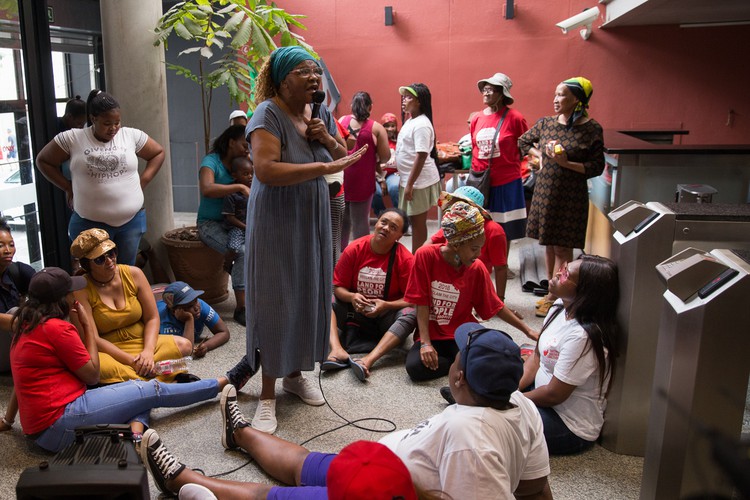We need lights to keep each other safe, say occupiers of Waterfront property
Protesters call on Western Cape government to restore electricity to occupied building after murder of activist
About 40 supporters of Reclaim the City blocked the entrance to the provincial Department of Transport and Public Works on Tuesday, preventing people from entering or leaving through the main entrance. Protesters, most of whom are living in the occupied Helen Bowden Nurses’ Home next to Cape Town’s Waterfront are calling for government to restore electricity and water to the building.
In a statement, Reclaim the City said the lack of electricity was affecting the safety of residents of Helen Bowden, which the occupiers have renamed Ahmed Kathrada House. “The house is pitch black at night. We need lights to keep each other safe. It is as if the province wishes to punish poor and working class people, whose only crime is that we needed a home.”
The protest action followed the fatal stabbing of activist Ayanda Denge in the building.
“We’re here for our safety and we’re here for basic services,” said resident Elizabeth Gqoboka. Without electricity, Gqoboka said, residents were living in darkness and fear.
She says that if there was electricity and lights, security or the tenants would have been able to identify people coming into and leaving the building. In 2017, Gqoboka’s husband Zamuxolo “Rasta” Patrick Dolophini was killed in the courtyard of the building.
Resident Lukhanyo Madyibi said the water and electricity had been turned off in the first week. He said the occupiers had written letters to government but no one had responded.
The building houses several hundred people and only has one working tap. Gqoboka says that in the morning and afternoon people queue waiting for water “as if we are waiting for a train”. For sanitation, residents have to carry buckets of water to flush toilets.
Protesters demanded an audience with Jacqui Gooch, the Head of Department at the Department of Transport and Public Works. Gooch was unable to meet but said via email that she would be available next week. Protesters agreed to that.
In an emailed response to a request for comment from GroundUp, Siphesihle Dube, spokesperson for MEC for Transport and Public Works Donald Grant, said: “The demand for free electricity by the persons who have taken unlawful occupation of, and caused significant damage to, the Helen Bowden building has been noted. We have agreed to meet with representatives of the group in order to discuss the legality of that demand as well as their safety concerns in general but have requested them first to put their issues in writing.”
“It should, however, also be mentioned that no person in South Africa is entitled to demand free, unlimited electricity provided to them by the state, as far as we are aware. This particular building has been unlawfully invaded at the encouragement of Reclaim the City, and is now substantially vandalised to such a degree that internal infrastructure including electrical cabling has been irreparably damaged. Gas is being used extensively by the occupants. Under these circumstances, the free unlimited supply of new electrical infrastructure may not be a viable, lawful or rational means by which to improve any legitimate security concerns.”
This article has been updated with the response from the MEC for Transport and Public Works.
Support independent journalism
Donate using Payfast

© 2019 GroundUp.
This article is licensed under a Creative Commons Attribution-NoDerivatives 4.0 International License.
You may republish this article, so long as you credit the authors and GroundUp, and do not change the text. Please include a link back to the original article.

